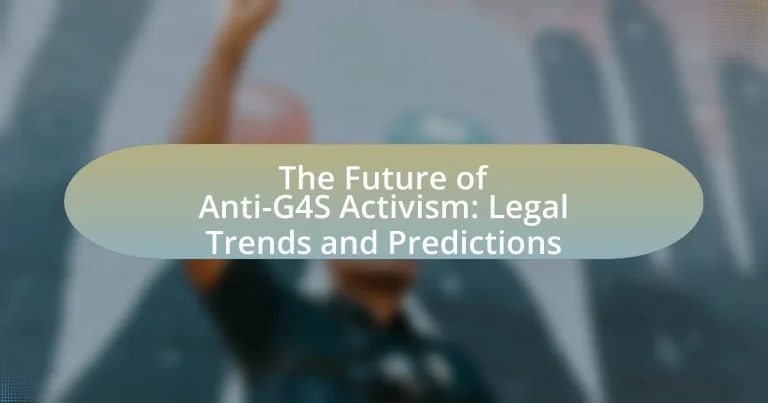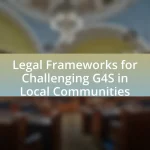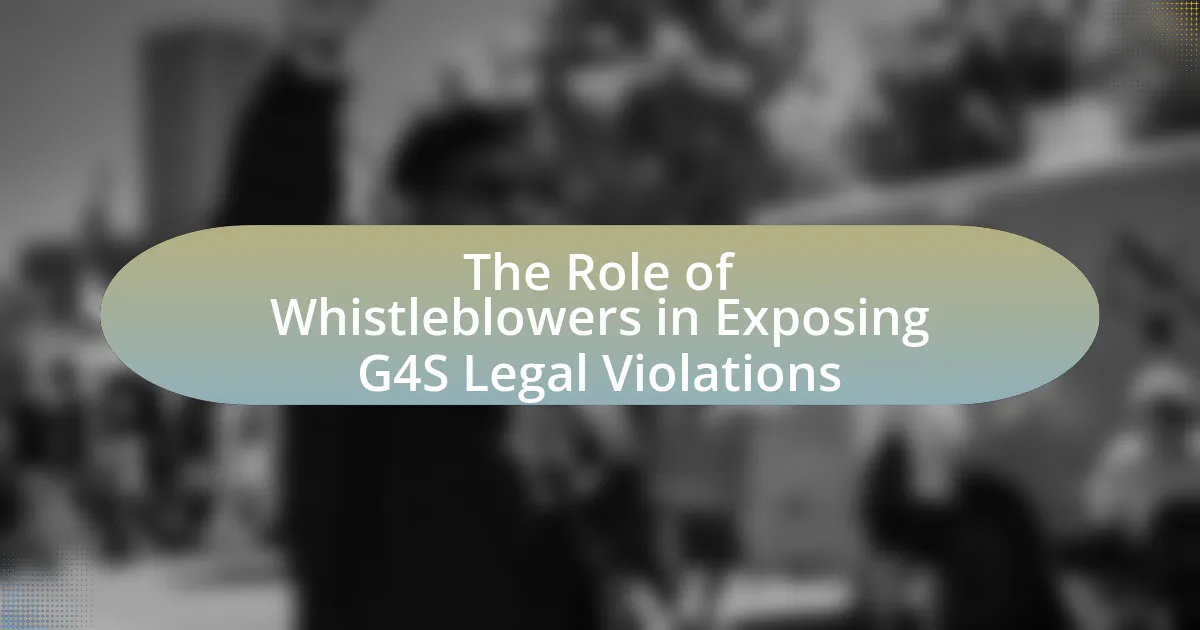Anti-G4S activism encompasses organized efforts by individuals and groups opposing the practices of G4S, a multinational security company criticized for its involvement in human rights violations, particularly in the Israeli-Palestinian conflict. The article explores the significance of this activism in promoting accountability for private security firms, historical events that have shaped the movement, and its connection to broader social justice initiatives. It also examines the goals of activists, strategies employed, and the impact of current legal trends on their efforts. Furthermore, the article discusses the role of international law, potential future developments in activism, and how technology is influencing strategies against G4S.
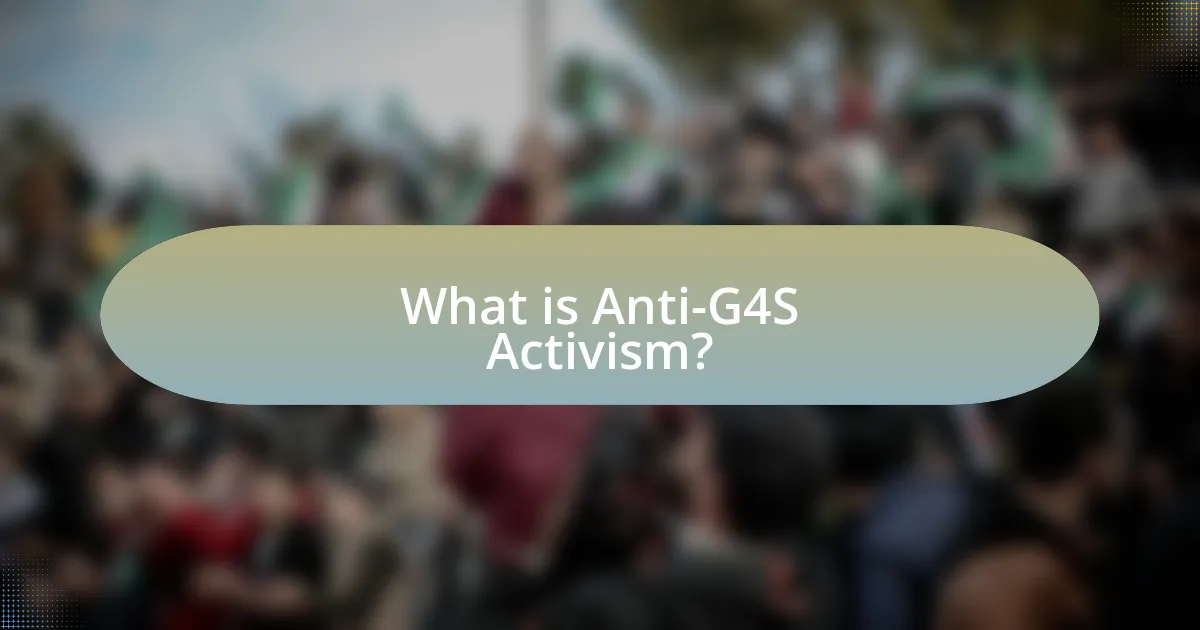
What is Anti-G4S Activism?
Anti-G4S activism refers to the organized efforts by individuals and groups opposing the practices and policies of G4S, a multinational security company. This activism is primarily driven by concerns over human rights violations, particularly in relation to G4S’s involvement in the Israeli-Palestinian conflict, where it has been criticized for providing security services to Israeli settlements and prisons. Activists often engage in protests, campaigns, and advocacy to raise awareness about these issues and to push for divestment from G4S by institutions and organizations. The validity of this activism is supported by various reports and studies highlighting G4S’s controversial role in security operations that impact marginalized communities.
Why is Anti-G4S Activism important in today’s society?
Anti-G4S activism is important in today’s society because it addresses human rights violations and promotes accountability for private security firms. G4S, a global security company, has faced criticism for its involvement in controversial practices, such as operating in conflict zones and providing services to governments with poor human rights records. Activism against G4S raises awareness about these issues, mobilizes public opinion, and pressures institutions to reconsider their partnerships with the company. For instance, campaigns have successfully led universities and organizations to divest from G4S, highlighting the growing demand for ethical business practices and social responsibility in the security sector.
What historical events have shaped Anti-G4S Activism?
Anti-G4S activism has been shaped by several historical events, notably the company’s involvement in controversial security operations and human rights violations. One significant event was G4S’s role in the Israeli-Palestinian conflict, where its security services were criticized for facilitating the occupation of Palestinian territories, leading to widespread protests and campaigns against the company. Additionally, the 2011 UK riots prompted scrutiny of G4S’s management of private prisons and detention centers, further fueling public dissent. The 2013 revelations about G4S’s involvement in the management of immigration detention centers in the UK, where reports of abuse and neglect emerged, intensified activism against the company. These events collectively galvanized various human rights organizations and grassroots movements, leading to a sustained campaign against G4S’s practices and policies.
How does Anti-G4S Activism relate to broader social justice movements?
Anti-G4S activism is intrinsically linked to broader social justice movements as it addresses systemic issues of human rights violations and corporate accountability. This activism highlights the role of private security firms, like G4S, in perpetuating injustices, particularly in contexts such as immigration enforcement and military operations. For instance, G4S has faced criticism for its involvement in the Israeli-Palestinian conflict, where its security services have been accused of facilitating human rights abuses. This connection to social justice movements is evident in the way activists mobilize against G4S, drawing parallels with other movements that seek to dismantle oppressive systems, such as Black Lives Matter and anti-colonial struggles. By framing their opposition to G4S within the larger narrative of social justice, activists emphasize the need for solidarity across various causes, advocating for a more equitable society.
What are the main goals of Anti-G4S Activism?
The main goals of Anti-G4S Activism are to challenge and dismantle the operations of G4S, a security company implicated in human rights violations, particularly in relation to its involvement in the Israeli occupation of Palestinian territories. Activists aim to raise awareness about G4S’s role in facilitating state violence and oppression, advocating for accountability and ethical practices in security services. This activism often includes campaigns for divestment from G4S, promoting alternatives to privatized security, and mobilizing public opinion against companies that profit from human rights abuses. The effectiveness of these goals is supported by documented instances of G4S’s involvement in controversial practices, such as operating detention centers and providing security for military operations.
How do activists define success in their campaigns against G4S?
Activists define success in their campaigns against G4S primarily through the achievement of specific policy changes, public awareness, and the cessation of contracts with the company. For instance, activists often measure success by whether G4S loses contracts with government entities or institutions, as seen in various campaigns that have successfully pressured universities and local governments to terminate their agreements with the company. Additionally, increased public awareness and discourse around G4S’s practices, particularly concerning human rights violations, serve as indicators of success, as they can lead to broader societal and political pressure against the company. These metrics reflect the activists’ goals of promoting accountability and ethical practices within the security industry.
What strategies are commonly employed in Anti-G4S Activism?
Common strategies employed in Anti-G4S activism include public protests, legal challenges, and awareness campaigns. Public protests aim to draw attention to G4S’s involvement in controversial activities, such as operating in conflict zones or providing security for institutions accused of human rights violations. Legal challenges often target G4S’s contracts and operations, seeking to hold the company accountable through litigation. Awareness campaigns utilize social media and educational outreach to inform the public about G4S’s practices and mobilize support for divestment from the company. These strategies are supported by various human rights organizations that document G4S’s actions and advocate for policy changes.
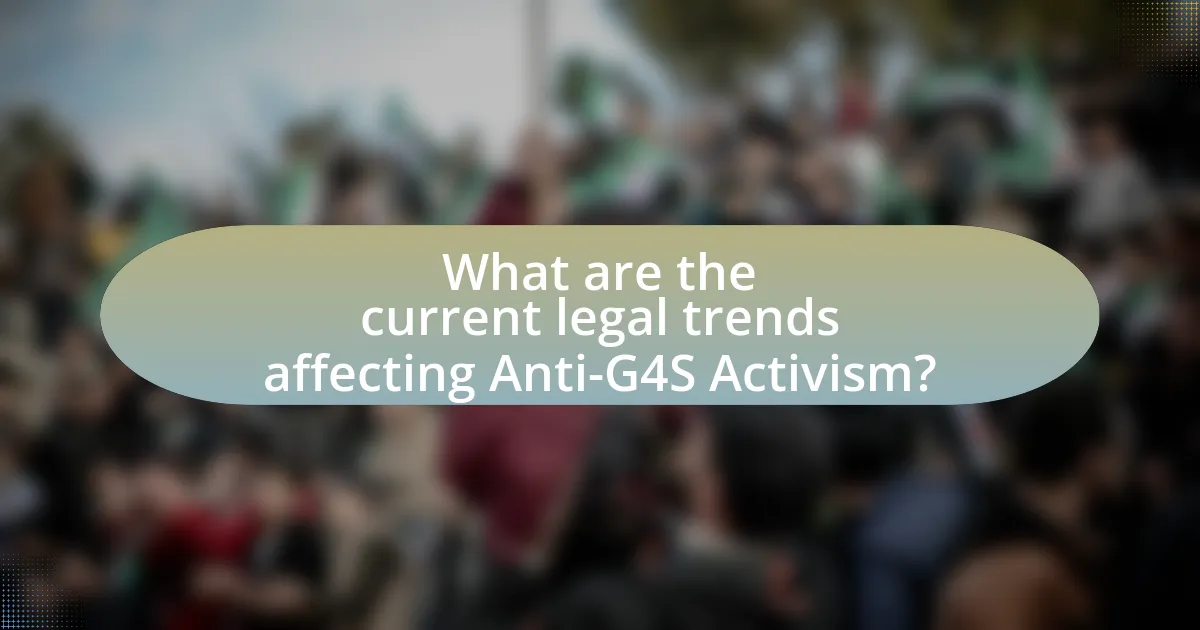
What are the current legal trends affecting Anti-G4S Activism?
Current legal trends affecting Anti-G4S activism include increased scrutiny of protest laws and the implementation of anti-protest legislation in various jurisdictions. These laws often impose stricter penalties for demonstrators and can limit the scope of permissible protest activities, thereby impacting the ability of activists to organize and express dissent against G4S. For instance, in the UK, the Police, Crime, Sentencing and Courts Act 2022 has introduced measures that allow police to impose conditions on protests deemed disruptive, which directly affects the operational strategies of Anti-G4S activists. Additionally, legal challenges related to freedom of speech and assembly are becoming more prominent, as activists seek to contest these restrictive measures in court, highlighting the ongoing tension between state interests and civil liberties.
How are recent legal changes impacting activist strategies?
Recent legal changes are significantly altering activist strategies by imposing stricter regulations on protests and public demonstrations. For instance, laws that increase penalties for civil disobedience or require permits for gatherings compel activists to adapt their approaches, often leading to more strategic planning and coalition-building to ensure compliance while still advocating for their causes. Additionally, the introduction of anti-protest laws in various jurisdictions has prompted activists to shift towards digital campaigns and online mobilization, as these methods can circumvent physical restrictions and reach broader audiences. This shift is evidenced by the rise in online petitions and social media campaigns, which have become essential tools for activism in response to legal constraints.
What specific laws have been enacted that affect Anti-G4S Activism?
Specific laws that have been enacted affecting Anti-G4S activism include anti-protest laws and legislation aimed at curbing the activities of organizations involved in boycotts and divestments. For instance, several U.S. states have passed laws that penalize companies and individuals who participate in boycotts against Israel, which can indirectly impact Anti-G4S activism due to G4S’s involvement in security services related to Israeli operations. Additionally, laws such as the UK’s Public Order Act have been used to restrict protests, affecting the ability of activists to organize against G4S. These legal frameworks create a challenging environment for activists by imposing penalties and restrictions on their activities.
How do courts interpret laws related to protest and activism?
Courts interpret laws related to protest and activism by balancing the First Amendment rights of free speech and assembly against governmental interests in maintaining public order and safety. This interpretation often involves assessing whether the protest is peaceful, the time and place of the protest, and the potential for disruption. For instance, in cases like Ward v. Rock Against Racism (1989), the Supreme Court upheld regulations on sound amplification at protests, emphasizing that restrictions must be content-neutral and serve a significant governmental interest. Courts also consider precedents that protect the right to protest while allowing for reasonable time, place, and manner restrictions, as established in cases such as Cox v. New Hampshire (1941).
What role does international law play in Anti-G4S Activism?
International law plays a crucial role in Anti-G4S activism by providing a framework for challenging the company’s operations, particularly in relation to human rights violations. Activists leverage international legal instruments, such as the Geneva Conventions and various human rights treaties, to hold G4S accountable for its involvement in controversial activities, including security services in conflict zones and detention facilities. For instance, the UN Guiding Principles on Business and Human Rights outline the responsibilities of corporations to respect human rights, which activists cite to argue that G4S’s actions contravene these principles. This legal basis empowers activists to mobilize public opinion, engage in litigation, and advocate for policy changes that align with international human rights standards.
How do international human rights standards influence local activism?
International human rights standards significantly influence local activism by providing a framework for advocacy and accountability. These standards, such as the Universal Declaration of Human Rights, empower local activists to demand compliance from their governments and institutions, thereby legitimizing their efforts. For instance, local movements often reference international treaties to highlight human rights violations, which can mobilize public support and attract media attention. Additionally, organizations like Amnesty International and Human Rights Watch offer resources and training that enhance the effectiveness of local campaigns, demonstrating the tangible impact of these global standards on grassroots activism.
What are the implications of international legal cases on Anti-G4S efforts?
International legal cases significantly impact Anti-G4S efforts by providing a framework for accountability and raising awareness of human rights violations associated with the company. These cases often highlight G4S’s involvement in controversial practices, such as operating in conflict zones or managing detention facilities, which can mobilize public opinion and increase pressure on stakeholders. For instance, legal actions in various jurisdictions have led to heightened scrutiny of G4S’s contracts and operations, prompting activists to leverage these findings to advocate for divestment and policy changes. The outcomes of such cases can also set precedents that empower further legal challenges against G4S, thereby strengthening the overall Anti-G4S movement.
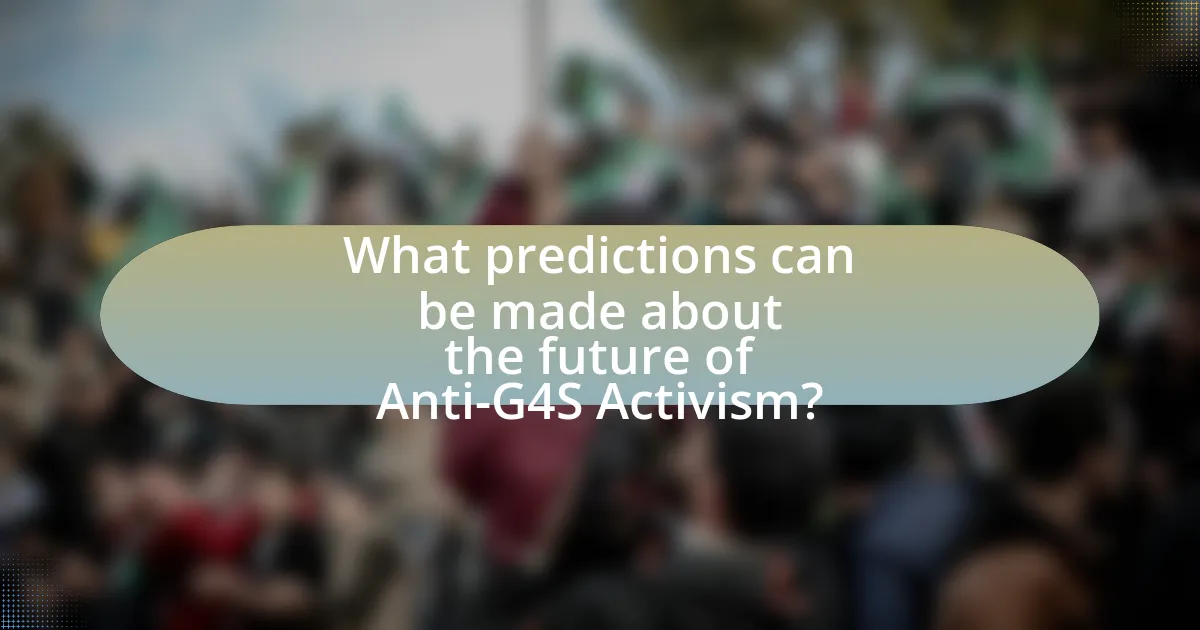
What predictions can be made about the future of Anti-G4S Activism?
Anti-G4S activism is likely to intensify in the future due to increasing public awareness and scrutiny of corporate practices related to human rights and security. As global movements advocating for social justice gain momentum, activists are expected to leverage digital platforms to organize protests and disseminate information about G4S’s controversial contracts and operations, particularly in conflict zones and detention facilities.
Evidence supporting this prediction includes the rise of social media campaigns that have successfully mobilized public opinion against corporations involved in similar practices, as seen in the Boycott, Divestment, Sanctions (BDS) movement against companies operating in Palestine. Additionally, legal frameworks are evolving, with more jurisdictions considering legislation that holds corporations accountable for human rights violations, which could further empower anti-G4S activists.
As a result, the combination of heightened activism, digital engagement, and evolving legal standards suggests that anti-G4S activism will not only persist but potentially grow in influence and effectiveness.
How might legal trends evolve in the coming years?
Legal trends are likely to evolve towards increased regulation of corporate accountability and human rights, particularly in relation to companies like G4S that have faced scrutiny for their practices. This evolution is supported by a growing global emphasis on corporate social responsibility and legal frameworks such as the UN Guiding Principles on Business and Human Rights, which encourage states to enforce laws that hold corporations accountable for human rights violations. Additionally, recent legislative movements in various jurisdictions, such as the UK’s Modern Slavery Act and the EU’s proposed Corporate Sustainability Due Diligence Directive, indicate a shift towards more stringent legal requirements for companies to assess and mitigate their impact on human rights and the environment.
What potential legal challenges could activists face in the future?
Activists could face increased legal challenges in the future, including stricter anti-protest laws, enhanced surveillance measures, and potential criminal charges for civil disobedience. Stricter anti-protest laws have been enacted in various jurisdictions, such as the U.S. states that have introduced legislation to impose harsher penalties for protest-related activities. Enhanced surveillance measures, including the use of facial recognition technology by law enforcement, could lead to activists being monitored and identified during protests. Additionally, civil disobedience may result in criminal charges, as seen in recent cases where activists were prosecuted for nonviolent actions aimed at disrupting business operations. These trends indicate a growing legal landscape that could hinder activist efforts.
How might changes in public opinion affect legal frameworks?
Changes in public opinion can significantly influence legal frameworks by prompting lawmakers to amend existing laws or create new legislation that reflects the evolving values and beliefs of society. For instance, the shift in public sentiment towards issues such as same-sex marriage led to legal changes in numerous countries, including the United States, where the Supreme Court’s decision in Obergefell v. Hodges (2015) legalized same-sex marriage nationwide, reflecting a broader acceptance of LGBTQ+ rights. This demonstrates that as public opinion shifts, legal systems often adapt to align with the prevailing social attitudes, thereby ensuring that laws remain relevant and representative of the populace’s views.
What innovations in activism could shape the future of Anti-G4S efforts?
Innovations in activism that could shape the future of Anti-G4S efforts include the use of digital platforms for organizing and mobilizing, as well as leveraging data analytics for targeted campaigns. Digital platforms, such as social media and crowdfunding sites, enable activists to reach a broader audience quickly, facilitating real-time communication and coordination. For instance, campaigns like #BoycottG4S have gained traction through social media, allowing for widespread awareness and participation. Additionally, data analytics can help activists identify key stakeholders and tailor their messaging, increasing the effectiveness of their outreach. Research indicates that campaigns utilizing data-driven strategies can achieve higher engagement rates, thus enhancing their impact on public opinion and policy change.
How is technology influencing Anti-G4S Activism?
Technology is significantly influencing Anti-G4S activism by enhancing communication, mobilization, and awareness among activists. Digital platforms enable real-time sharing of information, allowing activists to coordinate protests and campaigns more effectively. For instance, social media has been instrumental in spreading awareness about G4S’s controversial practices, such as its involvement in the Israeli-Palestinian conflict, leading to increased public scrutiny and support for divestment initiatives. Additionally, data analytics tools help activists track G4S’s contracts and operations, providing concrete evidence to support their claims. This technological integration has resulted in a more organized and impactful movement against G4S, as evidenced by the growing number of campaigns and public demonstrations globally.
What new strategies are emerging among activists?
Emerging strategies among activists include the use of digital platforms for organizing and mobilization, as well as legal advocacy to challenge corporate practices. Activists are increasingly leveraging social media to raise awareness and build coalitions, which allows for rapid dissemination of information and engagement with a broader audience. Additionally, legal strategies such as filing lawsuits against corporations like G4S for human rights violations are becoming more common, as seen in recent cases where activists have successfully held companies accountable through the judicial system. These approaches reflect a shift towards integrating technology and legal frameworks into activism, enhancing the effectiveness of campaigns against corporate misconduct.
What practical steps can activists take to navigate the evolving legal landscape?
Activists can navigate the evolving legal landscape by staying informed about current laws and regulations that affect their activities. This involves regularly reviewing legal updates, attending workshops, and consulting with legal experts to understand the implications of new legislation. For instance, the American Civil Liberties Union (ACLU) provides resources and legal guides that help activists comprehend their rights and responsibilities. Additionally, forming coalitions with other organizations can enhance knowledge sharing and provide a stronger collective voice in advocating for legal reforms. Engaging in training sessions on legal rights during protests can also prepare activists to respond effectively to law enforcement actions.
